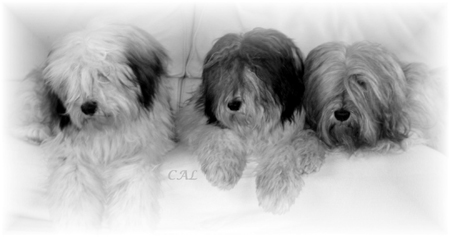
|
|
Christa Lochner, France - Val de Marne
http://www.nizinny-z-mazurow.eu/
The Quest for the Best PON Diet
| In my almost twelve years in PONS, I have noticed that the
most often asked question that owners puzzle over, is one which involves
PON diet. If anything excites PON lovers, this issue is among the top five
on the list of controversies. Politics aside, deciding on an appropriate
diet may mean the difference between a happy, healthy, symptom-free (minus
vomiting, diarrhea, itchy skin; reddened, gunky ears; itchy face and chin;
compulsive licking of the paws, etc.) PON and one which is on a life
long regimen of meds, high vet bills, and possibly even re-homing when an
owner's patience and money runs out.
What is the most scientific way to determine which diet is best for your beloved PON ? There are certain basic principles which need to be followed in an owners quest for the best possible diet: * Each owner needs to do his/her own research and think independently. Following the advice of those who have an agenda may not necessarily be beneficial to the health of your family PON. * Consult with your veterinarian and breeder if possible. Listen to their advice and then exchange information and research with other PON owners. Consult veterinary reports on the dangers of following certain diets. * Your PON'S general health, age, and life style need to be taken into consideration. If possible, inquire about your PON's litter mates and parents. Which diets have they followed and why were they put on specific diets ? What about your own life style ? Do you have the time and skills to craft an individual diet or is it necessary to offer commercial food ? Once you have established basic principles to guide you along in your decision, you need to inform your self of the basics of canine nutrition (by reading up on the subject) and conducting a comparison of available food on the market. If you have decided to offer your PON commercial dog food, you need to be able to intelligently read and understand food labels. The following link may guide you along with this task: http://www.dogfoodproject.com/index.php?page=labelinfo101 Although grains are not in themselves, a "bad ingredient" , it has been noticed that some PONS have reacted to wheat grains and may benefit from being offered dog foods that are formulated with non-grain sources of carbohydrates. Please click on the following link for a partial listing of grain-free dog foods: http://www.dogfoodproject.com/index.php?page=grain_free Objective (Scientific) PON owners will appreciate the following article on Pet Nutrition Principles, which includes a section on bones (with a link to actual cases of bone obstruction and issues involving the food value of bones). http://www.thepetcenter.com/imtop/nbasics.html The above reference did not discuss the high levels of bacteria found in raw foods. Please consult: https://pondigest.tripod.com/healthreports.html This page contains:
February 15, 2006, Vol. 228, No. 4, Pages 537-542
doi: 10.2460/javma.228.4.537
In summary, the quest for the best PON diet involves a wide range of factors, and what works for major forces in the breed, may not work well for the health and well being of your PON. Do your own research and try and become an independent thinker. Just think.....will those forces be there for you when disaster strikes ? If you have additional questions, please shoot us an email.
|
|
|
Christa Lochner, France - Val de Marne
ponbreeders/internationalrecipes/faq/digestiveupsets/pondiet/herding/committee/ponhoroscopes